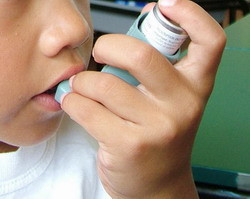A new multimillion dollar trial involving more than 3,900 infants born at Auckland, Middlemore and Wellington hospitals will aim to find out if using paracetamol in infancy to treat pain and fever is associated with childhood asthma.
Auckland paediatric emergency medicine specialist at Starship children’s hospital, Dr Stuart Dalziel, has received a $4.99 million programme grant from the Health Research Council of New Zealand (HRC) to carry out the trial – the first of its kind in the world.
Dr Dalziel will lead the trial alongside a highly experienced team of asthma and child health experts from the Auckland and Counties Manukau district health boards, Medical Research Institute of New Zealand (Wellington), and the universities of Auckland, Otago and Calgary (Canada).
Some of the New Zealand members of the research team led the highly respected International Study of Asthma and Allergies in Childhood (ISAAC), the largest international epidemiological study of childhood asthma.
The ISAAC study, which included data from over 200,000 children in 31 countries, has suggested that paracetamol given in the first year of life may influence the risk of developing later asthma. However, Dr Dalziel says that it is unclear if this finding is due to paracetamol itself or to the illness that led to it being given – for example, a chest infection.
“With this new trial, we will definitively answer whether paracetamol treatment, compared with ibuprofen treatment, as required for pain and fever in the first year of life, increases the risk of asthma at age six years,” says Dr Dalziel.
Paracetamol is the most commonly prescribed and over-the-counter medication dispensed to children in the first year of life, both in New Zealand and the developed world.
Dr Dalziel says he is thrilled to receive this HRC programme grant as there is an urgent need for research that leads to evidence-based primary prevention strategies to reduce the prevalence of asthma in children.
“To date, randomised controlled trials looking at the primary prevention of asthma have focused on dietary modification, probiotics, encouraging breast feeding, and avoidance of environmental triggers such as tobacco smoke, house dust mites and other allergens. Unfortunately, none of the intervention strategies trialled has provided sufficient evidence to lead to widespread public health intervention programmes,” says Dr Dalziel.
HRC Acting Chief Executive Dr Tania Pocock says asthma rates in New Zealand remain stubbornly among the highest in the world. One in seven children and one in nine adults receives treatment here for asthma, and Māori and Pacific children are disproportionately affected.
She says the results from this programme will be of relevance to all parents and health care providers who see young infants.
“If the results confirm that there is an association between paracetamol in infancy and later asthma, we will have the evidence for a public health intervention that has the potential to reduce New Zealand’s high rate of asthma. If, on the other hand, the results don’t confirm an association, it will provide reassurance to parents and medical professionals that this most commonly used medicine is safe,” says Dr Pocock.
Dr Dalziel’s research is one of five programmes awarded a combined total of $24.85 million in the HRC’s 2017 funding round. Others include a programme led by Professor Martyn Nash from the Auckland Bioengineering Institute at the University of Auckland who, together with a team of engineers, cardiologists and medical imaging specialists, is developing novel patient-specific tools to evaluate biomechanical factors such as stiffness and stress in heart damage.
See below for the full list of 2017 HRC programme grant recipients or to read lay summaries about the research programmes, go to our research repository and filter for ‘Researcher Initiated Proposals,’ ‘Programmes’ and ‘2017’.
Note: Dr Stuart Dalziel has established paediatric emergency medicine (PEM) research in New Zealand and is a recognised international leader in the field. He is currently the deputy chair of the global PEM research network and chairs the Paediatric Research in Emergency Departments International Collaborative (PREDICT), a network of children’s hospital emergency departments in Australia and New Zealand. Dr Dalziel currently leads a HRC clinical practitioner research fellowship study and project grant.
2017 HRC programme grants
Dr Stuart Dalziel, Auckland District Health Board
Prevention of asthma
132 months, $4,993,727
Professor Jeroen Douwes, Massey University, Wellington
Interventions to reduce occupational disease (IROD)
60 months, $4,999,989
Professor Parry Guilford, University of Otago
Reducing the burden of gastric cancer in New Zealand
60 months, $4,971,155
Professor Alistair Gunn, University of Auckland
Pathogenesis, detection and treatment of perinatal brain injury
60 months, $4,919,534
Professor Martyn Nash, University of Auckland
Biomechanics in heart disease
60 months, $4,964,879
